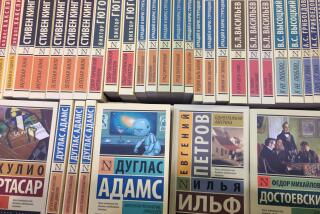Language Police Called Out to Rescue Latvian
- Share via
RIGA, Latvia — Contemporary Russian music is the rage in Latvia’s capital, but when listeners tuned in for their daily dose of dance tracks on a popular radio station, they got nothing but dead air.
Radio Bizness and Baltic was silenced for three days, caught in the cross-fire of a battle to defend the Latvian language from extinction.
The law requires 75% of all commercials and chat to be in Latvian, but Radio Bizness’ target audience is Russians living in Latvia, says Ivo Bankavs, its chief engineer. “They want to know what’s new in Russian music; they want to keep up with trends in Moscow; and they want DJs to speak Russian.”
The station is now in court fighting to keep its license.
The struggle stems from the fear of ethnic Latvians that their language may be swamped by Russian. Nearly 40% of the country’s 2.4 million people use Russian as their main language and often speak little or no Latvian, so the government is aggressively promoting Latvian with tough laws on public speech.
In the neighboring Baltic republic of Lithuania, whose language is similar to Latvian, such worries are less pronounced, perhaps because nearly 85% of the people are ethnic Lithuanians.
Estonia, whose native tongue is a close cousin to Finnish, has similar language laws to Latvia’s but also seems less anxious. Seventy percent of its residents are ethnic Estonians.
The Soviet Union annexed Latvia in 1940, and the Latvian language was overwhelmed by Russian during the country’s five decades as a Soviet republic. Soon after the Soviet Union crumbled in 1991, Latvia began reasserting its national identity. Latvian-only signs went up, and bilingual Soviet-era signs in Cyrillic were crudely scratched out.
But many towns and villages remain predominantly Russian, and TV viewers in Latvia can tune directly to Moscow channels.
The language law requires Latvian to be used at public events, and a government body devises Latvian equivalents to replace borrowed foreign words. A language police corps tries to ensure that everyone from doctors to bus drivers speaks enough Latvian to do their jobs.
Eighteen inspectors roam the country, making surprise visits to police departments or hailing taxicabs to test the drivers’ Latvian skills. Last year more than 3,000 inspections were made, and 2,500 people were fined from one to 50 lats, or less than $2 to $80, a healthy chunk of the average monthly wage of $240.
The government says the inspectors often let offenders off with just a warning, and insists they have so far never forced anyone out of a job or permanently closed a business.
“I am 100% sure that we must regulate these things because this is the only place in all the world where the Latvian language can survive,” said Baldurs Apinis, vice chairman of the state radio and television council, which wants to shut down Radio Bizness.
Many Russians say that even when they try to learn Latvian, they are resented.
“The language is used as a stick to beat us,” said Aleksandrs Rhzavin, an ethnic Russian who belongs to a group that campaigns for expanded cultural rights for Russians.
Russian speakers claim the law is often used to silence unpopular views.
In 1997, Russian schoolteacher Anatonia Ignatane, a critic of government policy to close Russian schools, campaigned for a seat on the Riga City Council. Just before the election, language inspectors claimed her Latvian skills were not up to holding public office.
“The laws are applied very selectively,” said left-wing lawmaker Boris Cilevics, a Russian-speaker who helped Ignatane take discrimination allegations to the United Nations Human Rights Committee, where a finding is pending. “If there’s someone they want to punish, they just find fault with his language abilities.”
During Soviet times, many Latvians feared their language would one day die. Philologist Ieva Zuicena, who co-wrote the language law, compiled a Latvian dictionary in the 1970s and reflected that she was “writing a monument to a soon-to-be lost language.”
Now officials feel they have a second chance, even if they can’t restore the times when Latvians and their language were dominant.
They’re certainly not dominant anymore.
The Soviets imposed a Russification policy that brought thousands of Russian and Ukrainian workers to Latvia to work in factories and stamp out nationalist sentiment.
In Daugavpils, Latvia’s largest city after Riga, Russians make up 87% of the population and you can go days without hearing a word of Latvian. Still, every street sign is in Latvian, as are announcements at the bus station.
Tatyana Zdanok, a leader of the Russian political party Equal Rights, calls the language policy “forcible assimilation.” She advocates copying Finland, where the Swedish language has official status and is used primarily in regions where Swedish-speakers are a majority.
Latvians argue that would remove the incentive for Russian-speakers to learn Latvian.
“Two languages would never work,” Zuicena said. “Our situation isn’t like that of Finland. So many Russians don’t speak Latvian and don’t want to speak it.”
In reality, Latvia is already a dual-language state. Russian was mandatory in schools in Soviet times, and most Latvians speak it.
Though many Russians remain monolingual, waiters and shop assistants often will use Latvian, or at least broken Latvian, before resorting to Russian or English.
Latvian also has become the language of business and higher education, and Russians need it to get good jobs.
“The idea that we don’t want to learn Latvian, that we’re lazy, is a myth,” said Leonids Raihmans, a Russian civil rights campaigner. “We just don’t want to become Latvian and abandon our culture.”
More to Read
Sign up for Essential California
The most important California stories and recommendations in your inbox every morning.
You may occasionally receive promotional content from the Los Angeles Times.










